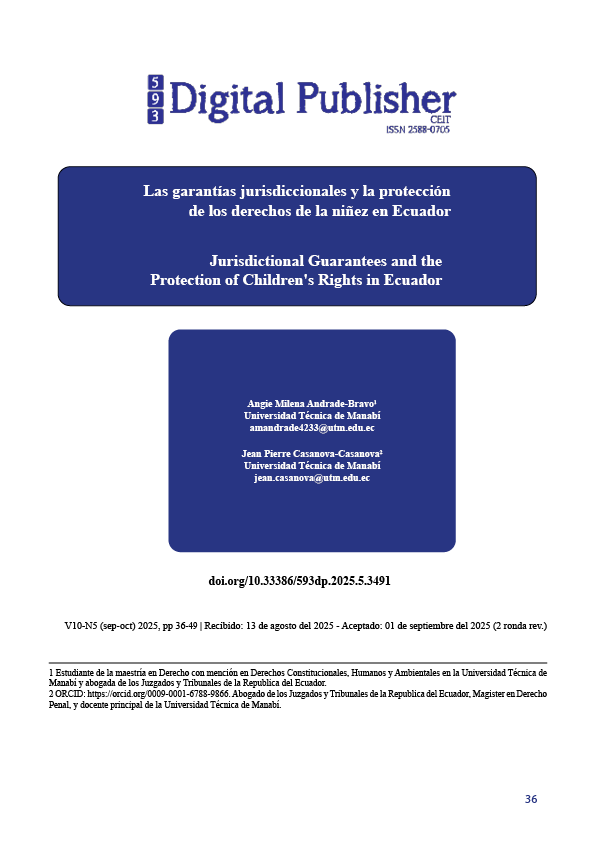Jurisdictional Guarantees and the Protection of Children's Rights in Ecuador
Main Article Content
Abstract
This study analyzes the impact of judicial guarantees on the protection of children's rights in Ecuador, evaluating their effectiveness in the application of national and international regulations. The current legal framework, including the Ecuadorian Constitution and treaties such as the Convention on the Rights of the Child (CRC), is examined, identifying gaps between legislation and its practical implementation. A qualitative methodology with a descriptive and analytical approach was employed, based on the study of case law, legislation, and specialized literature. Additionally, a documentary review of judicial rulings and public policies related to children was conducted to assess the effectiveness of judicial mechanisms in protecting this vulnerable group. The study, which is cross-sectional and exploratory, is framed within a socio-legal analysis from a human rights perspective. The findings reveal that, although Ecuador has a solid legal framework for child protection, challenges remain in its implementation, such as the lack of follow-up on court rulings and the absence of concrete measures that ensure effective protection for children at risk. It is concluded that public policies and the role of the judicial system need to be strengthened to reduce the vulnerability of children to violence, exploitation, and social inequality.
Downloads
Article Details

This work is licensed under a Creative Commons Attribution-NonCommercial-ShareAlike 4.0 International License.
1. Derechos de autor
Las obras que se publican en 593 Digital Publisher CEIT están sujetas a los siguientes términos:
1.1. 593 Digital Publisher CEIT, conserva los derechos patrimoniales (copyright) de las obras publicadas, favorece y permite la reutilización de las mismas bajo la licencia Licencia Creative Commons 4.0 de Reconocimiento-NoComercial-CompartirIgual 4.0, por lo cual se pueden copiar, usar, difundir, transmitir y exponer públicamente, siempre que:
1.1.a. Se cite la autoría y fuente original de su publicación (revista, editorial, URL).
1.1.b. No se usen para fines comerciales u onerosos.
1.1.c. Se mencione la existencia y especificaciones de esta licencia de uso.
References
Asamblea Nacional Constituyente. Constitución de la República del Ecuador. (2008). Registro Oficial No. 449. https://www.oas.org/juridico/pdfs/mesicic4_ecu_const.pdf
Asamblea Nacional. Código de la Niñez y Adolescencia. (2003). Registro Oficial No. 737. https://www.igualdad.gob.ec/wp-content/uploads/downloads/2019/12/codigo_ninez_adolescencia_nov2019.pdf
Ávila Santamaría, R. (2010). El derecho de la naturaleza: fundamentos. Revista Digital de la UASB, (82), 3–10.
Cevallos, D., & Torres, J. (2025). Capacitación judicial y efectividad de las garantías jurisdiccionales de la niñez en Ecuador. Revista Ecuatoriana de Derecho y Sociedad, 19(1), 77-101.
CIDH. (2023). Informe sobre derechos de la niñez y adolescencia en las Américas. OEA.
Comité de los Derechos del Niño de las Naciones Unidas. (2017). Observaciones finales sobre los informes periódicos cuarto a sexto combinados de Ecuador. Naciones Unidas. https://www.plataformadeinfancia.org/derechos-de-infancia/convencion-derechos-del-nino/?gad_source=1&gclid=EAIaIQobChMIyvCFq_StigMVdJ9aBR1sBhZoEAAYASAAEgJOWvD_BwE
Convención sobre los Derechos del Niño. (1989). Naciones Unidas. Sitio web de las Naciones Unidas. https://www.unicef.org/child-rights-convention?gad_source=1&gclid=EAIaIQobChMIl4Dr5PStigMVRp5aBR0ABARXEAAYASAAEgIlPvD_BwE
Defensoría del Pueblo del Ecuador. (2024). Informe anual sobre derechos de la niñez y adolescencia. Quito: DPE.
Defensoría del Pueblo del Ecuador. (2024). Informe anual sobre derechos de la niñez y adolescencia.
Espinosa, C., & García, M. (2021). Desafíos en la implementación de los derechos de la niñez en Ecuador. Revista de Derecho y Sociedad, 15(2), 123-145. DOI: https://doi.org/10.62574/g6mted33
Hernández-Sampieri, R., & Mendoza, C. (2018). Metodología de la investigación: Las rutas cuantitativa, cualitativa y mixta (6.ª ed.). McGraw-Hill.
Human Rights Watch. (2022). Ecuador: Derechos de la niñez bajo amenaza. HRW. https://www.hrw.org/es
Instituto Nacional de Estadística y Censos (INEC). (2020). Informe de Pobreza y Desigualdad. Sitio web del Instituto Nacional de Estadística y Censos. https://www.ecuadorencifras.gob.ec/pobreza-y-desigualdad/
Jaramillo, P., & Sánchez, R. (2022). La protección judicial de la niñez en Ecuador: avances y retos post pandemia. Revista Latinoamericana de Derechos Humanos, 33(1), 45-68. https://doi.org/10.17141/revlatdh.33.1
Jiménez, A., & Fraile, E. (2018). Guía para implementar el método de estudio de caso en proyectos de investigación. En Propuestas de investigación en áreas de vanguardia (p. 159). Barcelona.
López, J. (2020). Problemas y soluciones en la protección de los derechos de la niñez en el sistema judicial ecuatoriano. Cuadernos de Justicia y Derechos Humanos, 8(1), 67-89. https://www.corteidh.or.cr/sitios/libros/todos/docs/cuadernillo22.pdf
Oficina del Alto Comisionado de las Naciones Unidas para los Derechos Humanos. (2023). Protección de la niñez en América Latina: avances y retrocesos. ONU-DH.
Patiño, M. (2023). Impacto de la pandemia en los derechos de la niñez en Ecuador. Revista Andina de Estudios Sociales, 12(2), 89-110.
Pérez, A. (2019). Información y sensibilización en la protección de los derechos infantiles: Un análisis en Ecuador. Boletín de Derechos Humanos, 22(4), 98- 112. https://www.unicef.org/ecuador/media/3786/file/Ecuador_Diagnostico_SNDPINA%20_1.pdf.pdf
Reyes, C. (2020). Estrategia metodológica para elaborar el estado del arte como un producto de investigación educativa. Revista Electrónica Educare, 24(3), 1–21. https://doi.org/10.15359/ree.24-3.20
Sagot Rodríguez, Á. (2018). Los derechos de la naturaleza, una visión jurídica de un problema paradigmático. Revista Judicial, (68), 18–27.
Strauss, A., & Corbin, J. (2002). Bases de la investigación cualitativa: Técnicas y procedimientos para desarrollar la teoría fundamentada. Editorial Universidad de Antioquia.
Tantaleán, C. (2022). El enfoque socio-jurídico en la investigación del derecho. Revista de Ciencias Jurídicas, 24(2), 125–138.
UNICEF Ecuador. (2021). Estado de la Niñez en Ecuador. Sitio web de UNICEF ECUADOR. https://unicef.org.ec/?utm_source=google-grants&utm_medium=search&utm_campaign=ongoing_conversions_grants&utm_content=category_conflictos&gad_source=1&gclid=EAIaIQobChMI_eyd2PStigMVJZ5aBR0j4il2EAAYASAAEgIC4fD_BwE
UNICEF. (2022). Situación de la niñez en Ecuador 2022. https://www.unicef.org/ecuador
UNICEF. (2023). Derechos de la niñez en Ecuador: Informe de seguimiento 2023. UNICEF Ecuador.
Vega, M., Torres, E., & Rosero, J. (2021). Muestras en investigaciones cualitativas: Consideraciones teóricas y metodológicas. Revista Colombiana de Investigación en Educación, 18(1), 57–74.



